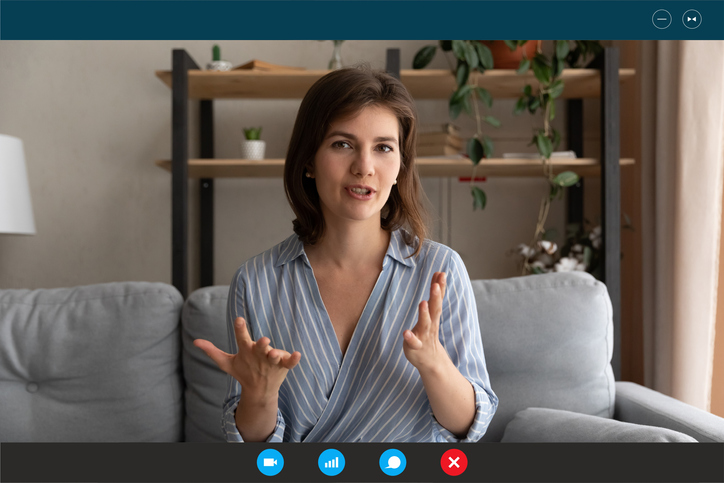The COVID-19 global pandemic disrupted the lives of people across the globe, as governments urged their citizens to slow the spread of the virus by limiting as much social interaction as possible. Job loss, changes in relationships, and forced social isolation led to a quarter of Canadians experiencing symptoms of depression, anxiety, and post-traumatic stress disorder (Government of Canada, 2021). With a greater need for counselling, as well as the fears and mandates around meeting others in person, a huge acceleration in the demand and acceptance of online counselling emerged.
During the shift due to COVID-19, many counsellors and therapists were surprised to find that they had positive experiences and attitudes towards online counselling and suggested that they would continue to do so after the pandemic (Bekes & Aafies-can Doorn, 2020). Previous studies also show that clients who have apprehensions about online counselling find that they have much more positive attitudes after experiencing it firsthand (Donovan et al., 2015). Most importantly, a meta-analysis of close to 10,000 clients provided strong support that online counselling can be just as effective as traditional in-person methods (Barak et al., 2008).
Our Diploma in Profession Counselling prepares you to begin a rewarding career helping others during some of the most difficult times in their lives. Our comprehensive program not only prepares you for potential senior-level positions but also includes leadership training and business classes to confidently operate your own counselling, coaching, or consulting business.
Keep reading for four important tips for conducting online sessions during your professional counselling career.
Ensure You Are Technologically Prepared During Your Counsellor Therapist Career
After your clinical counsellor training, you will be prepared with the knowledge and skillset to counsel individuals, couples, and groups with issues such as trauma and abuse, relationships, addictions, and more. When conducting online sessions, it is equally important to ensure that you are prepared technologically. A study that took place during the COVID-19 crisis showed that the preparedness of counsellors and technical functionality heavily impacted the process, results, and attitudes towards online counselling (Barker & Barker, 2022).
Having a well-maintained computer rather than using your mobile device will maximize audio and visual resolution. In addition, it’s important to invest in high-speed internet to uphold a strong connection that won’t lag or buffer. Furthermore, investing in a good quality headset will allow you and your client to hear each other more clearly. Finally, you need to ensure that you are using appropriate software that will protect your client’s confidentiality and privacy while protecting yourself from any legal or ethical consequences.

Ensure you are technologically prepared for online counselling sessions after your clinical counsellor training.
Guide New Clients Through the Online Counselling Process
Many of your clients may be trying online counselling for the first time. Or perhaps it is their first time trying any counselling at all. As with traditional in-person counselling, guiding your clients through what they can expect at the beginning of your first session together can enhance trust and build rapport (Fisher & Oransky, 2008), in addition to diminishing any anxieties they may be experiencing due to uncertainties. As with in-person counselling, you should go over details such as session length, the types of counselling methods you provide, and fees and payment.
With online counselling specifically, you may want to send a welcome email shortly after booking your first online appointment that provides a brief summary of what to expect, as well as a short checklist to ensure that your client is prepared for the session. This may include a high-speed internet connection, a quiet private space, apps or software needed, and a mobile phone or computer with video and audio capabilities. You should also mention the risks involved with confidentiality when counselling online and acknowledge the preventative measures you are taking. In addition, create a plan for technology failure and alternate methods that can be used if such an event occurs.
Be Distraction-Free During Sessions with Your Clients
Therapeutic alliance is the positive relationship and bond that a registered professional counsellor and their client build. Studies show that there is a strong link between therapeutic alliance and the outcome of counselling (Arnow & Steidtmann, 2014). One concern that many have when considering online counselling is whether a therapeutic alliance can effectively be built in situations where they are not face-to-face. With online counselling becoming more prevalent over the last decade, research shows that both patients and counsellors generally do develop positive therapeutic alliances online (Simpson & Reid, 2014). Further studies conclude that this alliance can develop just as strongly as in-person counselling (Cook & Doyle, 2002).
In order to achieve therapeutic alliance, one of the most important tips for online counselling is to ensure that you are undisturbed during your sessions, just as you would be if you were seeing your client in person. Ensure that you are in a quiet, private area where you will not be interrupted. If you do not have an office to work out of, make sure that your background and surroundings are esthetically pleasing, well-lit, and that the space feels intimate and contained. In addition, ensure that all other programs on your computer are closed with notifications turned off and that your phone is set to silent and put away.

Achieve a therapeutic alliance online by staying distraction-free in a private area during your counsellor therapist career.
Registered Professional Counsellors Must Set Clear Boundaries and Expectations for Communication
Unlike traditional in-person counselling, online counselling allows your clients to have easier access to contact you whether it be by email, online messaging, text, or phone. This does not mean that you are available at all times for your client. For this reason, it is important to first decide on and then openly discuss your boundaries. Explain to your client when and how they may contact you, and how long it may take you to respond to non-emergency issues. Also, be sure to explain what steps they should follow in the case of a mental health emergency. In addition, it can be beneficial to create separate social media accounts for your business and your personal life to assure that your boundaries will not be crossed with your clients.
Are you interested in a counsellor therapist career?
Contact Rhodes Wellness College for more information today!
Works Cited
Arnow, B. A., & Steidtmann, D. (2014). Harnessing the potential of the therapeutic alliance. World psychiatry : official journal of the World Psychiatric Association (WPA), 13(3), 238–240. https://doi.org/10.1002/wps.20147
Barak, A., Hen, L., Boniel-Nissim, M., & Shapira, N. (2008). A comprehensive review and a meta-analysis of the effectiveness of Internet-based psychotherapeutic interventions. In www.ncbi.nlm.nih.gov. Centre for Reviews and Dissemination (UK). https://www.ncbi.nlm.nih.gov/books/NBK76016/
Barker, G. G., & Barker, E. E. (2021). Online therapy: lessons learned from the COVID-19 health crisis. British Journal of Guidance & Counselling, 1-16. https://doi.org/10.1080/03069885.2021.1889462
Bekes, V., & Aafjes-van Doorn, K. (2020). Psychotherapists’ attitudes toward online therapy during the COVID-19 pandemic. Journal of Psychotherapy Integration, 30(2), 238-247. https://doi.org/10.1037/int0000214
Cook, J. E., & Doyle, C. (2002). Working alliance in online therapy as compared to face-to-face therapy: preliminary results. Cyberpsychology & behavior : the impact of the Internet, multimedia and virtual reality on behavior and society, 5(2), 95–105. https://doi.org/10.1089/109493102753770480
Donovan, C. L., Poole, C., Boyes, N., Redgate, J., & March, S. (2015). Australian mental health worker attitudes towards cCBT: What is the role of knowledge? Are there differences? Can we change them? Internet Interventions, 2(4), 372–381. https://doi.org/10.1016/j.invent.2015.09.001
Fisher, C. B., & Oransky, M. (2008). Informed consent to psychotherapy: protecting the dignity and respecting the autonomy of patients. Journal of clinical psychology, 64(5), 576–588. https://doi.org/10.1002/jclp.20472
Government of Canada, S. C. (2021, September 27). The Daily — Survey on COVID-19 and Mental Health, February to May 2021. Www150.Statcan.gc.ca. https://www150.statcan.gc.ca/n1/daily-quotidien/210927/dq210927a-eng.htm
Simpson, S., & Reid, C. L. (2014). Therapeutic alliance in videoconferencing psychotherapy: A review. The Australian Journal of Rural Health, 22, 280–299. http://dx.doi.org/10.1111/ajr.12149










